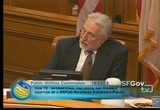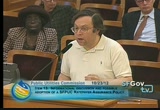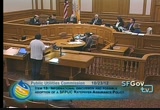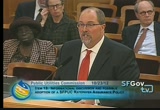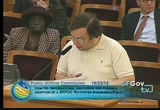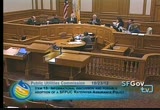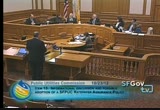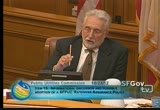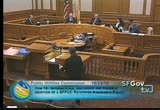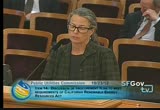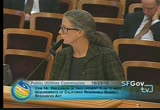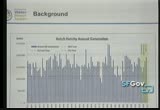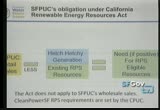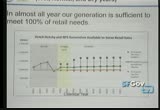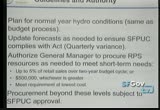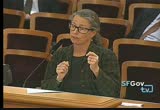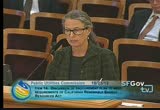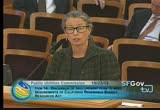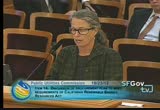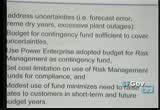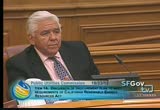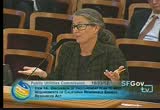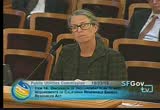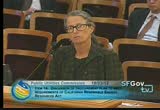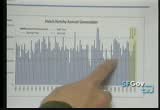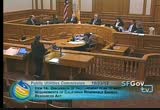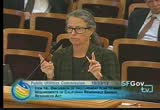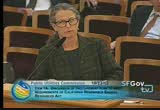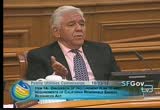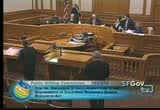tv [untitled] October 27, 2012 11:00pm-11:30pm PDT
11:00 pm
it sets an objective. and then the second sentence deals with budgets. * okay, not with expenditures during the year to respond with emergencies, but the budget. so, we're planning how we're going to spend money. in that case if we're planning to spend at a rate that is higher than inflation, we owe an explanation to ourselves and to everybody who pays rates. >> [speaker not understood]. >> yes. >> commissioner vietor has articulater. all right, any other comments or public comments? i know [speaker not understood] had a comment here. so, let's make sure we have a motion in front of us first. >> i moved it. >> moved and seconded? >> second. >> second. the motion is before us. >> david filcoff. thank you for the discussion. i'm excited about this policy. i get very excited about commission policy. i may be the only one, but hey. so, i was -- >> careful with the podium. yes, sorry. i'm sorry i was actually not at
11:01 pm
the cac meeting last month because it was just before a jewish holiday. but i had some quick comments on this. i'm very supportive of the proposal, but just had some minor tweaks. on page 1 of the policy itself under personnel management, it says personal costs, i believe that should probably read "personnel costs." with regard to commissioner moran's amendment, if just want to be careful that we're not requiring some particular set of findings in the budget adoption resolution for each increase and each enterprise or any particular line item that exceeds the cost of inflation if that -- if the intent -- and i understand it, with the intent that there be some general statement in an adopted budget that makes those kinds of findings.
11:02 pm
broadly that's fine, but not as to each particular line item that may exceed the rate of inflation for whatever reason. >> i absolutely agree with that. i think an explanation has to cite some specific reasons. right. >> but if you have offsetting increases and decreases, there's no sense of explaining every increase. that's certainly the intent. agreed. >> do you want to be more specific or just leave it at that? i think it probably works as is. i don't know. >> i guess it's looking at whether or not the operating costs or it's just the budget in general, the overall sfpuc budget. >> you have to ask the maker of the motion. >> yeah, i'm just looking. >> if we amend it to say any
11:03 pm
budget that increases budgeted expenditures above this level, basically it's referring to a budget as a whole, not a line item in the budget. that might clarify. >> is there a time issue here that we have to pass this today, or should we take a little more time to refine the language? i just want to make sure the intent is not lost because we didn't think of everything. >> liedic to to support the proposal. >> there's no time issue. we can perfect it with each iteration. * i'd like >> [speaker not understood]. >> we can further amend it. >> any other comments, david? >> there is perhaps -- well, why don't we let mr. filkoff conclude. as to the proposed correspondent card, i like this a lot. i think this is good in terms of a qualitative assessment. i think it should be
11:04 pm
accompanied by some sort of quantitative measures, which i'm sure todd will develop and i'm happy to consult with. i'm not sure i would use the word "he can logical" there. i would use environmental. it seems like a better read. * ecological i would make this a report to the advisory committees as was suggested published in the website. i assume this policy and the referenced policies are or will be on the website. i would think that the report card could include the bureaus and not just the three enterprises. and where it refers to water resource adequacy, there could probably be some language that is more appropriate to wastewater and power because it must come from one of those places. there should be a date on the bottom of the policies because the policy may get amended in the future. and then, so, the reference to
11:05 pm
the attached policy should probably say rate assurance policy of today's date or whenever the commission adopts it. i'm happy to talk further to todd, but again really good work and i'm very supportive. thank you. >> if i might amend my amendment with the consent of the second. consistent with the comments of mr. fill cough made, the sentence would read any budget that increaseses the operating budget above this level we'll be supporting. >> i find that acceptable. * >> any other comments? >> i just had one final on the report card as well. i had sort of a similar question around just whether there could be some quantitative -- i mean, i don't really have a solution, but something that kind of says this is an area that [speaker not understood] at a glance. i'm not sure the parks score card is quite right, but i think it's moving in that direction where it says [speaker not understood] has moved from whatever percentage
11:06 pm
it was down to 14 parks that still need attention. so, some way to be able to at a glance look at this and say, well, community sustainability piece needs a little bit of work or something that is more -- >> i think the policy is what you're actually adopting today. the score card is something we will use in the budget process as a tool and we'll refine that over time based on your comments. we'll be coming back to you. that's not what you're adopting, just a policy [speaker not understood]. >> why don't we deal with the motion. i do have a comment about the score card. we can get past the resolution. >> all right. so, your motion as amended. >> yes. >> second. >> second. that was his second. >> sorry. [laughter] >> all right. all those in favor signify by saying aye. >> aye. >> all those opposed? all right, thank you, motion carries as amended. >> do we then have to fill in the main motion?
11:07 pm
>> right. >> [speaker not understood]. >> you mean the main motion? >> the main motion. >> second. >> all right. mr. courtney gives you the second. any public comment on the main motion? any other comment by any commissioner? seeing none, all those in favor signify by saying aye. >> aye. >> opposed, abstentions, being none, the motion is carries. >> if i might just make a comment about the report card. >> yes. >> i have one thing that is important is that the report card has very hard links to the specific policies that we have. and it might even make sense to break the report card down to -- we have a rates policy, how are we doing against that. we have a rate payer assurance policy. how are we doing against that? we have a community benefits policy. how are we doing against that? so, the report card reflects the policy structure that the commission has adopted and that the findings are related to the specific elements of the policy
11:08 pm
and that way i think we can -- i love the idea frankly of using the report card as an opportunity to cut the story out to people so that they know, number one, that we care how we're spending their money and that they can have some assurance and comfort to the fact we're doing it properly. so, thank you. >> thank you very much. >> thank you. >> our next item, ms. hale, number 14. >> item 14, discussion of procurement plan to meet the requirements of the california renewable energy resources act. >> thank you. barbara hill, assistant general manager for power. i am here today to discuss with you the way we are proposing to comply with the california renewable energy resources act. it's more commonly referred to as the rpf legislation. the act requires the puc to meet 100% of our retail sales
11:09 pm
with hetch hetchy and rps [speaker not understood] generation. what we're proposing to do is rely on our existing processes where possible and appropriate to incorporate compliance into our budgeting and financial planning process. in most years, in 83% of all years, business as usual, no extra action is necessary on the city's part to comply with this legislation. we would need to buy any additional rps supplies, 83% of the time. what i'm here today for is to get input and direction from you on our proposal to give our general manager the authority to procure rps supplies to meet any unexpected requirements when they do occur, typically in dry years or in the event of an unexpected generator outage. and to set a cost limitation
11:10 pm
for compliance, which is allowed under the act. the commission does not need to take action today. it needs to adopt a procurement plan, however, pursuant to the legislation and the enabling regulation by january 1st, 2013. so, i think we've given you plenty of time to take in the information and digest it before asking for action. you can give us direction. by way of background, i put a slide up if sfgtv folks could go to the overhead for me. it shows, it shows our hetch hetchy annual generation. and, you know, we have 90 years worth of data that we're relying on to project forward. this slide shows you both the actual hetchy generation in the blue bars. the wet year projection, what
11:11 pm
we refer to as a wet year, what we refer to as normal year here in the green dash line. and then dry year. we use those same scenarios for our budget planning and financial planning. we set the budget every -- on our budget cycle every two years, assuming a normal generation year, a normal water year. of course, there are exceptions to that which this slide shows. so, the act requires that we -- that we start in calendar year 2011 meet 100% of our retail energy needs from hetch hetchy and rps eligible resources on a calendar year basis. it does have some limited exceptions and i'll describe those to you. what that means to us, sort of the simple math which i show here on the slide is we take
11:12 pm
our demand, our puc retail sales. we subtract out our supply, which is made up of hetchy generation and resources. and if that equation results in a positive, that indicates that we need to procure rps eligible resources. as i said, most years it's going to be a negative number. we're going to have more supply than we do retail demand. the act does not apply to our wholesale sales. so, we do not need to meet any rps requirements for sales we make to the districts or into the western systems power pool. and the act has requirements for community aggregation plans like our clean power sf program. but those requirements are set by the cpuc, not by you as a
11:13 pm
governing body. so, as i mentioned in most years, there's no need to procure additional supply. the small volumes of additional rps resources would be needed only during dry years. our forecasted need is small, unpredictable, short-term, and nonrecurring. as the slide shows here -- let me move it so you can see -- are actual or actual generation is shown here. the normal year forecast is the green line. we have a forecasted wet year. the forecasted dry year. and then this orange line is our retail sales. so, you can see the demand and the supply. the difference between the green and the orange retail is
11:14 pm
-- retail sales is our wholesale sales out into the market. so, in almost all years our generation is sufficient to meet 100% of our retail needs. and it's typically of a quality that meets our rps obligation. so, turning, then, to our proposed procurement plan guidelines and authority, the plan for normal year, we are proposing that we plan to meet normal hydro year conditions just like we do in the budget. we are planning to update our forecast as needed to ensure that we comply with the act. that's also consistent with how we report on a quarterly basis for budget variances. and as i mentioned, we're seeking authorization to have the general manager procure the rps resources as needed within these boundaries, up to 5% of retail sales over the two-year budget cycle. that's about 50,000 megawatt
11:15 pm
hours. or $500,000, whichever is greater. his discretion would be capped at that amount. and to meet that requirement at the lowest cost. we would bring to the commission any procurement necessary to comply with the law beyond those levels for further action. so, we're asking -- >> for november 13th? >> beg your pardon? >> you plan to present that november 13? >> no, r i'm planning to present the actual plan and a resolution november 13th. this is -- this give you the information behind it. >> ahead of time? >> yes. >> okay. so, the commission will adopt the procurement plan november 13th? >> if you're comfortable with it, yes. >> but i'm not clear on this. what would the commission workshop november 23rd? >> that's today, that's what we're doing right now. >> oh, this is the workshop? >> this is the workshop. >> i didn't realize that. >> this is the discussion. >> welcome to the commission workshop. >> yes, it's your workshop.
11:16 pm
[laughter] >> we have this year -- excuse me, in 2011, just to take that policy proposal that i just put before you and describe what it means to us. in 2011 it was a wet year. there would have been no additional rps purchases needed to comply with the law. the calendar year we're in right now, 2012 is more of a dry year. and we have some plant outages. we project that we will need to procure rps resources to meet the acts requirements. they will be small so they're going to be under the 5% of retail sales limit. we're forecasting each month to monitor and evaluate the need. we expect we will need to procure renewable energy credits equivalent to 50,000 megawatt hours before january 1st, 2013. -- to comply with this law * . we expect that will cost us
11:17 pm
about $50,000. the act also allows for cost limitations, as i mentioned, if exceptions. the exceptions briefly are that our obligation is capped at the same level as other publicly owned utilities. so, for example, the requirement for publicly owned utilities is 20% of your retail sales need to be met by rps compliant resources. in 2012 that rises to 33% by 2020. we may delay compliance due to circumstances beyond our control, and we may adopt a cost limitation. so, putting the cap and the delay ability together, for example, if we had an unexpected outage that was significant, but made it so our hetchy generation was less than
11:18 pm
67% of our retail sales, that would mean that we would only have to procure up to 33% of renewable power and we wouldn't have to do -- meet that compliance requirement within the same calendar year. we'd have some flexibility on delaying our compliance due to that unforeseen circumstance. so, focus just briefly on the cost limitation. you know, it's really intended to allow us to address uncertainties, like extreme dry year or plant outages. allows us to budget for any contingencies. we presently have in our adopted budget a budget line item for risk management as a contingency fund. at this point that is set at $4 million a year. we are proposing that the cost
11:19 pm
limitation be limited -- excuse me, that the use of that risk management fund, that $4 million, be applied as it is today, but also be available to us to meet this rps requirement. it would be -- allow us to use those funds, modest amounts of those funds, minimizing the need to raise rates on -- to customers in future budget years. it's really a safety valve to make sure that our compliance doesn't push costs up unreasonably. president torres, you alluded to the timeline. let me put it up on the screen here so that you can see more specifically where we're at. >> right, that's good for the public to see that. >> yes. >> my other question is in terms of the rps eligible, the renewables, what percentage are we looking at in terms of renewables?
11:20 pm
we have solar, wind -- >> right. so, now our resource mix is our biogas, our hydro and solar. >> okay. >> and because we have this separate section of the rps law, we don't have to procure beyond those resources except very infrequently. and we are proposing that that procurement be from renewable energy credits. >> so, the way they're titled would be appropriate? >> they would be. they would be qualified resources under state law. >> if we had -- >> if we had them, yes. >> and we have no geo thermal here? >> correct. we have purchased it in the part, but we do not have any in our portfolio today. >> where do we purchase it from? >> we purchase from the geo thermal system in guyser. >> in guyser ville? >> yes. >> are they acceptible our hydro now? >> yes, commissioner, they are accepting our hydro.
11:21 pm
yeah, another hooray, that's three in one meeting. [laughter] >> we have -- we were able through the legislative process to explain that were we to have the same rules applied to us, we would just be selling our hydro and substituting in other renewable resources. the objective of the law is to in part to reduce the emissions from power plants. we don't have any power plants that emit. >> [inaudible]. >> yeah, i have a couple of questions. so, we can't bank the rps resources? >> we can. under the rules, we can -- if we have -- if we do that math equation and we have lots of extra rps compliant power, we can bank those renewable energy credits. you earlier allowed us to register with us the western
11:22 pm
system that allows folks to have those credits certified in a way that's recognized by the marketplace. we are registering those credits, then, and we can use them ourselves in a subsequent compliance year. so, for example, in this year because last year was wet, 2011 was wet, we had some extra. this year we're going to need to purchase some, but we're also taking some of what we generated last year and applying it to this year. so, we're not having to purchase as much as we otherwise would have. >> and they don't expire? >> they do expire. under the regulations, they do expire. so, we would either use them or if we projected that we wouldn't need them, we would attempt to sell them before they expire. so, we extract the value one way or the other. >> that was my other question. and then i thought we budgeted in our budget for some additional renewable procurement. >> yes, we do have additional renewable procurement in our budget. some of that capacity, if you
11:23 pm
will, that financial capacity is absorbed by the power purchase agreement we have with sunset, for the sunset soler output. but we also recognize that even in any year, what we may need may need we exceed forecast. we're looking at the risk management part of our line item to fund these unusual circumstances. >> and when was the last time that we weren't able to meet our needs? and i know that these rps standards are new, so, maybe we didn't have the same issues. >> we didn't have the same requirement. >> but have we been able to meet our needs with hetch hetchy with our parr? >> there have been times we had to meet short-term purchases in order to meet our needs. and maybe the best way to look at that is to again look at the first background slide i put up where you can see there are some years where a lot of our
11:24 pm
generation is considerably lower. you could tell that our retail sales pretty much track a wet year. not exactly, but in recent years, sorry, they pretty much track a dry year. so, the dry year line you see on this slide here is about where our retail sales are or have been in the last 10 or so years. and, so, looking at these -- the tail end of this slide here, you can see although years we have plenty of power to cover our retail sales. >> so, one of the things this slide doesn't give you is sort of like that day to day sort of variation that happens. that's an annual sort of like slide. and when you look at it sort of by quarter or by month, great, you have lots of power in april, may, june, and you have very little in september, october, november. until the rain starts and the snow starts again. so, if there is a cycle that kind of goes on and we do do
11:25 pm
short term purchases in what we call quarter 3 and quarter 4. just to cover, you know, our existing customers. >> and that's why we'd be procuring the recs this year, right? >> yes. this is a lower than normal water year and we've had some outages. >> right. >> thank you very much. >> anybody have any questions? yes, commissioner moran. >> on the -- on page 12 of the presentation where you talk about the cost limitation proposal. >> yes. >> and you have $100 per megawatt hour. >> yes. >> which is twice what the penalty level is that was set by the cpuc for pg&e. >> yes. >> what is the thinking as to why we doubled that? why do we choose to have a twice what the cpucd?
11:26 pm
>> one is a penalty is one is a cost limitation. it could certainly be lower if you prefer a lower -- to cap the amount the puc will pay at a lower level, we could. it was really just -- we're just providing that as a benchmark for you to understand sort of some of the context in which we're proposing this number. >> and the market for renewables ranges from currently what to what? >> it's also about 30 to 50 megawatt premium on top of the brown power. brown power price. >> so, 30 do $50 per megawatt hour premium? >> yes. >> and this says that it would be market -- in case of an adverse market which is probably when we would most likely need to buy this stuff, it gives us some price flexibility there. >> right. to the extent that we are low on hydro -- california is low on hydro, and, so, market prices are going to be up overall as a result. >> thank you. >> what is the impact of the
11:27 pm
deductions on solar utilization? have we measured that? tax deductions that are -- >> have we measured that? we certainly realize that it lowers the cost. >> right. >> and that's why we pursued a third-party for our development of the sunset solar project. >> okay. >> and didn't fund it ourselves. i can't recall off the top of my head, maybe you do, todd, what the -- mr. reedstrom, what the financial impact of that was for us. >> it was pretty significant. by way of comparison, the tax credit, tax credit financing that we successfully undertook for current sunset solar brought the average cost per kilowatt hour down to 23-1/2 cents. that compares to average costs of our hydro system. all the costs included of about 9 cents. so, without the tax credit federal financing as well as the state programs, it would have been over 30 cents
11:28 pm
kilowatt hour. >> you need to take credit for that. >> we have a line item -- >> that's why i try to raise some of these issues because when you and the work that this agency has been doing, i am so proud of the fact that the cost saving that ultimately go to the rate payer, we need to talk about. if we're going to get your trumpet so you can blow your horn, we'll do that. you should be commended because you've been taking into account, you've been a steady steward of the process and look what it's producing for the rate payer here in san francisco. i'm sure most jurisdictions, knowing some of the mayors in those other jurisdictions, i don't think they've had as good a record as we've had here in san francisco. i want to say thank you. i think it's important to bring it out into the public view. >> thank you. it's definitely a team effort. a lot of detail. >> no question it's a team effort. my comments were directed to the team. any other comments? we don't need to accept anything. [speaker not understood]. >> there's no action. >> right, no action necessary. i guess there is an action
11:29 pm
necessary to go into executive session, closed session. >> thank you. >> any public comments before we move into closed session? all right, we need a motion to assert the attorney/client privilege. >> move to assert the attorney/client privilege. >> second. all those in favor signify by saying aye. >> aye. >> all right. >> closed session items, item 17, existing litigation lennon versus city and county of san francisco. item 18, existing litigation cadmin versus city and county of san francisco. item 19, existing claim, chung versus city and county of san francisco. and item 20, existing litigation city and county of san francisco versus pacific run and gun club. >> let the record show that the privat
113 Views
IN COLLECTIONS
SFGTV: San Francisco Government Television Television Archive
Television Archive  Television Archive News Search Service
Television Archive News Search Service 
Uploaded by TV Archive on

 Live Music Archive
Live Music Archive Librivox Free Audio
Librivox Free Audio Metropolitan Museum
Metropolitan Museum Cleveland Museum of Art
Cleveland Museum of Art Internet Arcade
Internet Arcade Console Living Room
Console Living Room Books to Borrow
Books to Borrow Open Library
Open Library TV News
TV News Understanding 9/11
Understanding 9/11